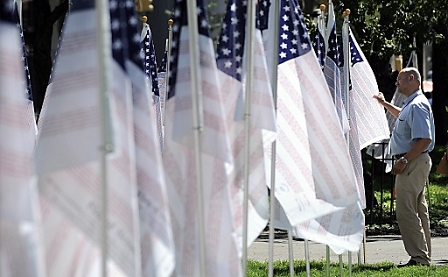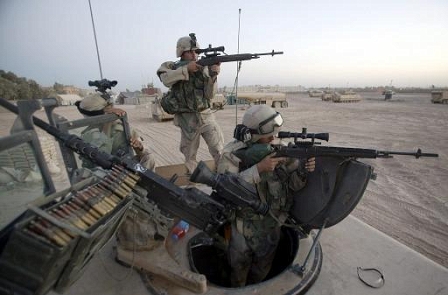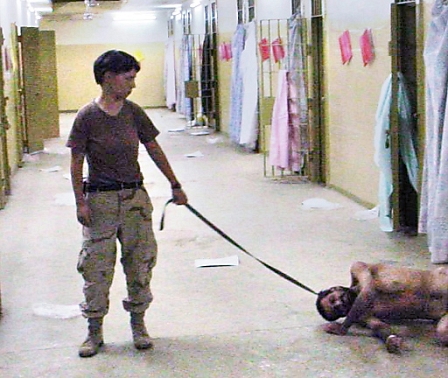Erstellt am: 10. 9. 2011 - 13:22 Uhr
9/11
Subscribe to the Reality Check podcast and get the whole programme after the show.

abc news ho
The 11th of September 2001 is for me and many others what the assassination of John F. Kennedy is for older generations - the day you will always remember where you were, what you were doing, and how you heard of the horrific events in the United States. I happened to be pushing my 20 month old daughter in the buggy, on our way to the playground when I got a call on the mobile, telling me what was happening. I continued to the playground, while getting regular phone updates, and I will always remember how surreal it was to observe the innocence of children playing, all the while knowing what was unfolding in another part of the world.
10 Jahre nach 9/11
- Wir sind alle New Yorker (Christian Lehner)
- 9/11 Ten Years On (Joanna Bostock)
- Verschwörungstheorien zu 9/11 (Simon Welebil)
- Ein Besuch am Ground Zero (Christian Lehner)
The attacks of 9/11 happened at a time when the United States was facing what the American political scientist Josef Nye has called "The Paradox of American Power". When they occurred, the U.S. was arguably at the zenith of its power, says Reinhard Heinisch, head of the Department of Political Science at the University of Salzburg, who spent more than 20 years living and working in the United States. “Globally speaking it was at its peak. It had had a decade of huge success, there was the internet revolution, the high tech revolution, it had balanced its budget.” The paradox is in the vulnerability of such a strong superpower, a vulnerability illustrated so graphically by the terrorist attacks.

apa
Before 9/11 there was relatively little American interest for international relations. President George W. Bush had entered office with a strong domestic focus and was often criticized for showing so little interest in foreign affairs. In the 1990s, his predecessor Bill Clinton had had difficulty getting Americans to pay attention to massacres in Rwanda or bloody conflicts in former Yugoslavia. But this lack of interest in the outside world was turned around by the events of 11th September. “Suddenly these events shifted the entire focus of this hugely powerful country onto, not only international relations, but on a relatively small part of the world and from that moment forwards, everything was filtered through the events of 9/11.”
In the historian’s view 9/11 was a striking episode in the history of Islamist terrorism, a continuation of a narrative that included the previous attack on the World Trade Center in 1993. Osama bin Laden had clearly been planning this for a long time, says Mitchell Ash, Professor of Modern History at the University of Vienna, and it was seen as “an episode in a very long-term jihad or holy war against not only the United States, but the capitalist system, the West in general, with the World Trade Center as its major symbol.” Ash suggests that it is an episode in a parallel, American, narrative “in which there had been surprises or shocks to America’s self confidence, to which the United States responded with a surplus of technology.” As the “best example” of this, Ash cites the attack by Japan on the United States Naval Base at Pearl Harbor in 1941, which brought the U.S. into the Second World War. “It’s no accident that immediately after 9/11 people said ‘this is another Pearl Harbor’.” The “surplus of technology” in that case, was of course the dropping of nuclear bombs on Hiroshima and Nagasaki in August 1945. The US didn’t respond to 9/11 with nuclear attacks “but they did mobilize … all of the smart technology they had available for war, fighting first in Afghanistan and then Iraq.” This was the approach favored by Secretary of Defense Donald Rumsfeld, and which became known as “The Rumsfeld doctrine”. It focused on sophisticated technology and air power rather than the use of large ground forces. There was no shortage of critics, and it turned out that technology alone wasn't enough.

EPA
The emphasis on security and the use of military technology, of course, went hand-in-hand with the rise of the neo-conservatives and hardliners. The Rumsfeld doctrine also embodied the idea that American power was most effective when not weighed down by international alliances. Before 9/11 American foreign policy had been guided by pragmatists, people who believed in the wisdom of working together with institutions and alliances. After 9/11 the idea of multilateralism in American foreign policy was out. The irony, says Reinhard Heinisch, was that it was the political left which had always argued that America wouldn’t be safe until the world was safe. “Suddenly there were these neo-conservatives who said we have to take the region in the Middle East and convert these regimes in to democracies, and we will be safe if the region is democratized. The neo-conservatives had always been a minority but in that very moment they seemed to have an answer. If you want to fight terrorism and al Qaeda, an alliance or power politics doesn’t help you very much, but if you try to convert those countries into democracies and deny [the terrorists] safe havens – this was an idea that carried a lot of weight and that was the debate where [the neo-conservatives] suddenly became very strong.”
As Mitchell Ash points out, 9/11 also ushered in the mobilization of a different kind of technology to which Americans themselves were subjected: the technology of security, more specifically the technology of Homeland Security. In the immediate wake of the attacks Ash accurately predicted what was about to happen and describes his anger “at the loss of my freedom which was going to happen when they ramped up the security apparatus”. He finds it disturbing that people have become used to “these kinds of invasive security procedures, the violations of millions of people’s human rights every day”.
In terms of human rights, 9/11 ushered in what Manfred Nowak regards as “the lost decade.” Nowak is an Austrian human rights lawyer who was the United Nations’ Special Rapporteur on Torture from 2004 to October 2010. The last half of the 20th Century, he says, had seen many achievements in terms of human rights, for example the international rule of law and the absolute prohibition of torture. The reaction of the Bush administration to 9/11 with its “War on Terror” undermined many of these achievements. “That had a very far reaching influence on many other countries in the world who said, if even the United States, the cradle of democracy and human rights, is obviously violating human rights, we are also fighting against terrorists so why shouldn’t we do the same?” The list of examples includes Guantanamo, the abuse of detainees in Abu Ghraib prison in Iraq, water boarding, rendition flights, and secret prisons for terror suspects.

EPA
There’s also a more subtle way in which the US response to 9/11 affected human rights. The 1990s, in Nowak’s view, were a positive decade, which saw “velvet” revolutions in Central and Eastern Europe, peacekeeping operations, and moves towards the establishment of the International Criminal Court. There was also momentum towards reducing poverty in the Millenium Development Goals but “many of the resources already pledged for reducing poverty were all of sudden diverted to one main objective of the international community and this was fighting terrorism by military means”. The irony is that security and development are not separate issues – the one depends on the other, and the military approach failed to address the root causes of terrorism such as poverty and the Middle East conflict.
Ten years after 9/11, Manfred Nowak sees grounds for optimism, citing three main points; “The so-called war on terror is over. Obama really brought change, even if he didn’t look into past crimes, but there is change and a different policy. Secondly, there’s more multilateralism again and third there’s the Arab Spring”. It’s not just the fact that states which were suffering under dictators and human rights violations now have a democratic movement, but also that “in the United Nations, in the Human Rights Council, for instance there is now a different dynamic, which is something we couldn’t even have hoped to see in the first decade of this century.”

epa
9/11 Reality Check-Special zum Nachhören
Dieses Element ist nicht mehr verfügbar


